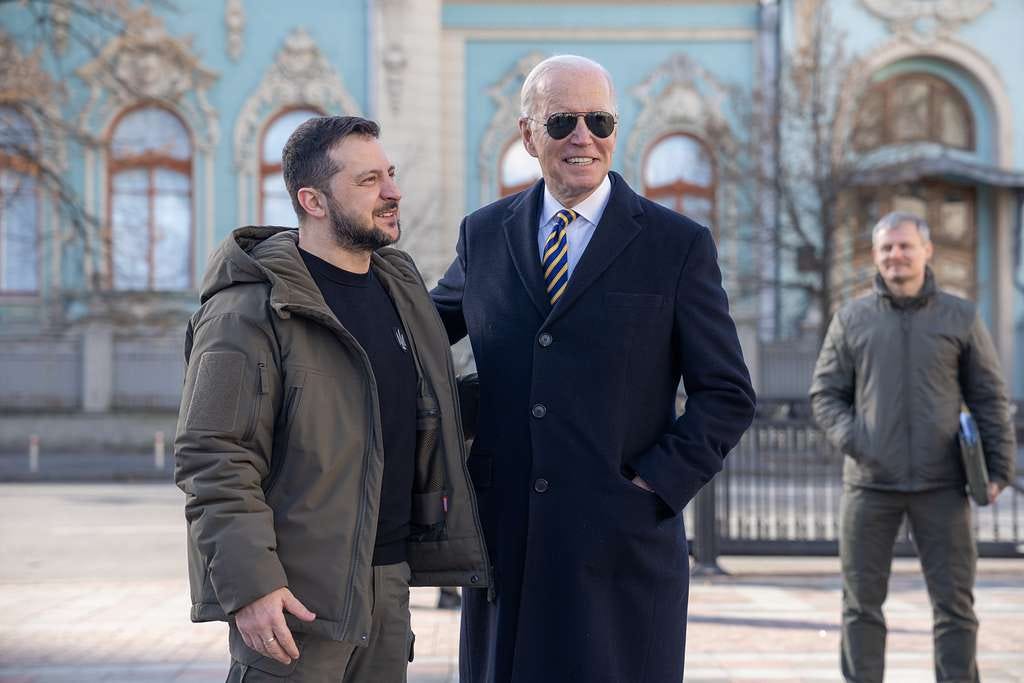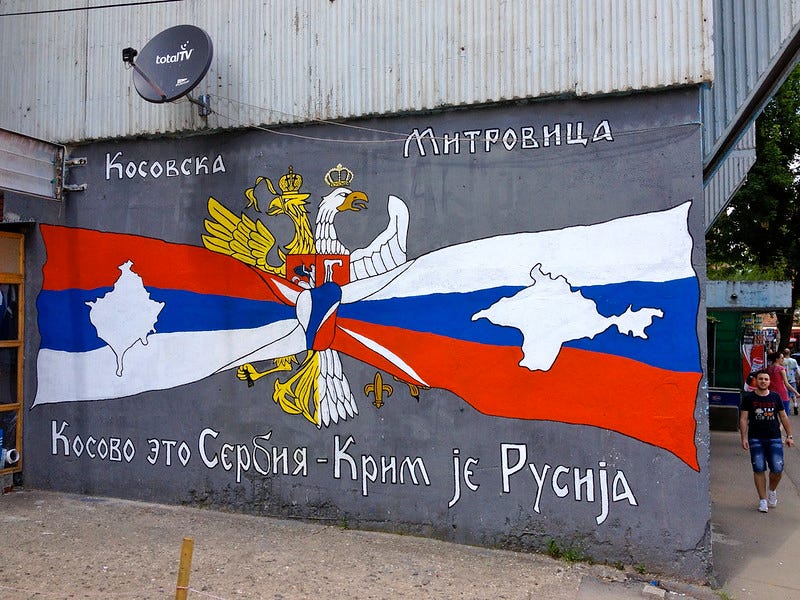Last Two Weeks in Eastern Europe: Apr. 8-21, 2024
The US finally passed a major aid package for Ukraine, Poland arrested people involved in Russian assassination plots, and tensions rose in Kosovo around an election boycott

What You Need To Know:
This roundup combines last week’s top news with important underreported stories
1. The US finally passed a massive, life-saving aid package for Ukraine and approved using frozen Russian assets to help the country
After months of delays and political jockeying driven in part by Donald Trump, the US House of Representatives finally passed a major $61 billion aid package for Ukraine on Saturday. The package will likely include missiles, air defense systems, artillery, and more, which have been desperately needed on Ukraine’s frontlines since late 2023. The aid also includes funds for increased intelligence coordination between the US and Ukraine and purchases of advanced weapons systems by the US from domestic military contractors. In addition, the US House passed a bill to use frozen Russian assets to assist in Ukraine’s defense, following similar recent moves in the EU.
Why it matters: Despite recent efforts in Europe to shore up funds for Ukraine, all parties have been painfully aware that Ukraine’s future defense hinged on the approval of this American aid package, and Ukraine’s Zelensky has already said that this funding could save thousands of lives. The aid comes at a crucial moment — Russia is gearing up for a spring offensive and has identified Kharkiv city as a potential target of operations this year, and although US aid is slated to start arriving in Ukraine in a matter of days, Ukrainian troops will continue to face an uphill battle along a 1,000 km-long front where Russia has intensified operations in the weeks since Vladimir Putin’s victory in Russia’s rigged elections in March.
2. Poland arrests individuals allegedly involved in plots to assassinate Zelensky and a Navalny ally in Lithuania
Poland announced on Thursday that it had detained a man who was preparing to conduct espionage for Russia as part of a plot to assassinate Ukraine’s Zelensky by passing information to Russian agents about the Rzeszów-Jasionka airport in southeastern Poland. A day later, Poland also detained two other men in a raid who allegedly attacked Russian anti-government activist and Navalny ally Leonid Volkov in Lithuania. Poland also detained a Belarusian national working with the two men, who were apparently linked to Polish football ultras.
Why it matters: These arrests come mere weeks after a previous Polish-Czech crackdown on a Russian spy ring in Poland, and follow various other instances of individuals carrying out acts of espionage for Russia on Polish territory that have focused on critical infrastructure for Western weapons deliveries to Ukraine like the Rzeszów-Jasionka airport. However, these latest allegations point to the involvement of Polish nationals in Russian-backed assassination plots for the first time, marking a potential escalation in Russia’s hybrid war against targets on NATO territory.
3. Serbs in North Kosovo boycotted a key ethnically-charged local election as tensions between Kosovo and Serbia continue to mount
Ethnic Serbs in the north of majority-Albanian Kosovo overwhelmingly boycotted an election to remove ethnic Albanian mayors from their posts on Sunday, thus rendering the vote invalid and undermining an effort by the US and Europe to defuse ethnic tensions in the country. The boycott was led by an ethnic Serb party that had previously supported the vote to replace Albanian mayors with Serbs but changed its position for reasons that remain unclear — although authorities in Kosovo maintain that pressure from Belgrade was to blame. These events took place as Kosovo warned of a possible invasion by Serbia, which has reportedly built up military bases along the country’s borders where Kosovo police are currently on high alert.
Why it matters: The appointment of ethnically Albanian mayors in North Kosovo sparked violence in the area last year, after which Serb gunmen crossed the border into Kosovo and engaged in a shootout with security forces. The apparent willingness of Serb political actors in the north to continue to leave the issue unresolved threatens to raise temperatures in Kosovo even further, likely to the benefit of Serbia, whose pro-Russian President Aleksandar Vučić stands to gain politically from the ongoing crisis in the country. Although it seems unlikely at this time that another war will break out in Kosovo, the longer tensions mount without diplomatic and democratic solutions, the more the potential for renewed violence will grow.

4. Poland, Hungary, and Slovakia came out against the EU’s landmark migration pact, with Slovakia stating it would not implement the law
On April 10, Polish Prime Minister Donald Tusk stated that the new migration pact the EU ratified this month is “unacceptable” for Poland, echoing concerns voiced by Poland’s previous right-wing government, and surprisingly, aligning himself with Hungary’s PM Viktor Orbán, who also criticized the pact upon its passage. On Tuesday last week, Slovakia’s PM Robert Fico joined the pair, stating that Slovakia would not implement the pact as it currently stands.
Why it matters: The new EU migration pact is the result of eight years of talks between EU members since the migration crisis of 2015, and in addition to speeding up asylum processes, puts in place a controversial solidarity mechanism in which member states can either agree to host refugees and migrants arriving in “frontline” countries or pay to support them. The migration pact has been opposed by European right-wing populist parties since even before it was ratified, and Orbán in particular has long spoken out against it. Now, the combined efforts of the Polish, Hungarian, and Slovakian governments pose the most high-profile opposition to the pact so far — nevertheless, their votes alone will not be enough to stop the pact’s passage into law.
5. Thousands of Serbs, alongside Bosnian Serb leader Dodik, staged a protest denying the genocide of Bosniaks during the Bosnian War
Thousands of Bosnian Serbs rallied on Thursday against the internationally accepted notion that Serb forces committed genocide against ethnic Bosniaks in the town of Srebrenica in 1995, buoyed by Bosnian Serb separatist leader and Putin ally Milorad Dodik. The protest was held in response to a resolution currently under consideration at the UN that would recognize the events at Srebrenica as a genocide, and Dodik has hinted that if the resolution is passed, the Bosnian Serb territory of Bosnia would withdraw from the country’s government.
Why it matters: Serbia, together with Bosnia’s Serbs, have long denied that they committed genocide in Bosnia during the 1990s, however this latest protest took place against the backdrop of increasing political paralysis in Bosnia, driven in part by Dodik and his backers in Serbia itself. Already standing trial for violating Bosnia’s post-war political order this year, Dodik’s threats to secede from Bosnia and Herzegovina are gathering steam, increasingly driven by a narrative of oppression at the hands of international powers and a sense of historical injustice focused on Serbs’ claimed innocence during the wars of the 1990s. This latest protest is yet another step toward a potential renewal of ethnic tensions in an increasingly unstable Bosnia.
Other trends:
— Polish President Andrzej Duda met with Donald Trump to discuss support for Ukraine and efforts to raise NATO countries’ defense spending. Despite having previously come out staunchly against supporting Ukraine, Trump’s stance has softened over the last several weeks.
— Poland, Lithuania, the US, and other NATO members started exercises along the strategic Suwałki Gap in Poland and Lithuania on Sunday. Belarusian forces loyal to Russia have recently staged drills near the gap as well.
— Private donors in Slovakia have bypassed the country’s anti-Ukrainian government and crowdfunded almost 3 million euros for ammunition purchases for Ukraine.
— Latvian prosecutors have charged a Latvian national with traveling to Ukraine to commit acts of sabotage on behalf of Russia.
— Moldova’s government began facing renewed political pressure from Gagauzia, another pro-Russian region within its borders alongside Transnistria, which demanded higher status for the Russian language in the region and rejected recent proposed judicial reforms. Gagauzia is currently led by Yevgenia Gutsul, who has asked Putin for help this month in its battles with Moldova’s central government.
— The US considered sending additional military advisors to Ukraine, who would not play a combat role, but would assist Kyiv’s government and military.
— Outgoing Bulgarian Prime Minister Nikolai Denkov stated that Russia is preparing to do whatever it takes to regain its influence in Bulgaria after efforts by Denkov’s government to root out Kremlin influence.



